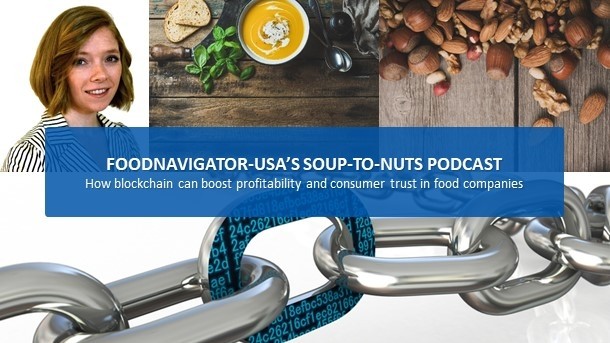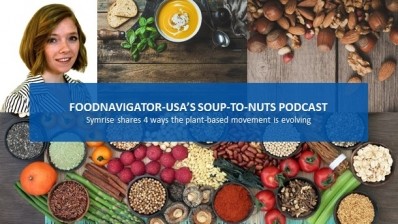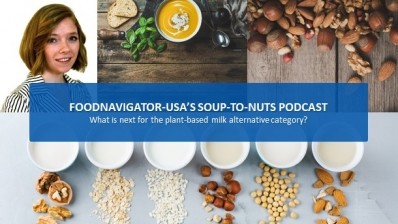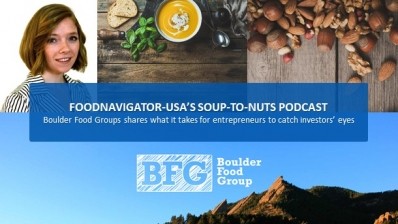Soup-To-Nuts Podcast: The benefits of blockchain for the food industry expands far beyond safety

For starters, the technology’s ability to identify where an ingredient came from and who has interacted with it at each stage of the supply chain offers significant food safety enhancements – a quality that has made FDA Deputy Commissioner for Food Policy and Response Frank Yiannas a big proponent of blockchain.
At the Grocery Manufacturers Association annual Science Forum earlier this spring he lauded the technology’s track-back capabilities for finding the source of outbreaks as well as the multiple checks it creates for potentially stopping an outbreak before it spreads.
But, the benefits of the technology don’t stop there.
In this episode of FoodNavigator-USA’s Soup-to-Nuts Podcast, Pratik Soni, who is the co-founder and CEO of the supply chain management solutions company Omnichain Solutions, and the president of the frozen novelties company Ruby Rockets share how a new software-as-a-service platform created by Omnichain uses blockchain to boost sales and customer satisfaction with real-time insight into online and store-level demand, improve order management efficiencies, streamline inventory control and retail space planning, and much more. They also help clear up some confusion and myths about what blockchain is and isn’t.
Blockchain isn’t just for the financial industry
Blockchain may be a buzz word that appears in headlines and is bandied about with confidence on social networking sites and at conferences, but the reality is most people are still unsure what it is, and many think it either is restricted to just the financial industry or that it is a panacea for all business woes everywhere.
As Soni explains, neither of those choices is right. Rather, he said, a more accurate way to think of blockchain is as a shared ledger that offers four key elements of security.
“Blockchain is really a shared business reality” that “allows multiple global and diverse business partners to transact with trust, transparency and accountability through cryptographic security and its automated consensus and shared and distributed standard,” he said.
“So, what that means is if you look at the supply chain as a whole,” there is an entire web of players who may not all be connected directly to each other but each play a role in the overall picture – and blockchain creates a central location where they all can touch base and build consensus, he added.
Beyond that, it operates on four key elements: consensus among trading partners, providence, immutability and a single place to determine lineage of an asset or transaction.
How blockchain can improve supply chain management
Soni also points out that while the financial industry is the first place that mainstream America saw blockchain applied, it is far from the only vertical that can benefit from the technology. In fact, he said, the next biggest vertical that can benefit from the technology is supply chain management.
In 2018, only about 5% of the supply chain industry used blockchain, but this is projected to reach 54% in the next five years and shift how the industry as a whole operates, Soni said.
So, what does this mean specifically for the food and beverage industries? Soni explains it means a faster way to detect and prevent outbreaks, it means ensuring products actually meet certification standards and enabling consumers to see that products are sourced responsibly. He also notes that Omnichain uses blockchain to help improve businesses’ profitability and reduce lost sales and inventory carrying costs.
It does this in part by using advanced machine learning and algorithms to more accurately forecast where demand will be and what needs to change in the supply chain to meet that demand in a more timely fashion, Soni explained.
The end result, according to Soni, is a 7 to 10% increase in sales for most of Omnichain’s clients post implementation.
That may sound promising, but how realistic is that and how does that compare to implementation and management costs associated with running blockchain technology? According to Stephen Davis, who is the president of Ruby Rockets, which makes natural frozen fruit and vegetable pop with no added sugar and a dairy free yogurt, the technology is the real deal.
“Our whole brand mission is bringing fruits and vegetables in fun novel ways to eat” without adding sugar and in a way that kids love and parents trust, Davis said.
He added blockchain helps ensure that consumer trust by showing shoppers where products come from and that the ingredients meet the high standards set by the company.
According to Davis the technology has helped Ruby Rockets not only earn the trust of shoppers, but also of retail and e-tail outlets who stock its products.
“In terms of retail, it goes back I some cases to if a retailer has a high concern about where ingredients are coming from,” and do they meet their quality standards without damaging the planet, he said.
Implementing blockchain
Manufacturers that like the sound of blockchain and what it has to offer may still be hesitant to adopt the technology for fear that installing and tailoring it will be difficult and expensive – and if their current system isn’t broke, why fix it?
Soni says he gets it. But he also assures that companies don’t need to “rip and replace” their current supply chain management systems – rather he says they can simply layer Omnichain’s blockchain technology over the top. He also notes that companies don’t even need to hire a blockchain expert because Omnichain can offer specialists who can fill that resource void.
Omnichain is not the only fish in the sea when it comes to applying blockchain to supply chain management or other aspects of the food and beverage industry. Other companies offer different applications and services and both Soni and Davis encourage manufacturers that are interested in the technology to do their research and find the right partner.
















